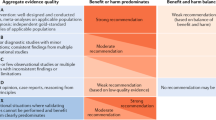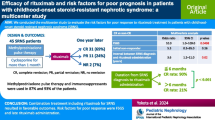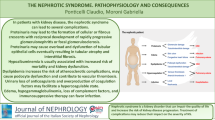Abstract
The patient and graft survival are the primary endpoints to evaluate safety and efficacy of the immunosuppressive treatments in renal transplantation. Today, however, the results are so good that a huge number of patients is needed to find statistically significant differences between treatments. Secondary endpoints are, therefore, used. Infections and other side effects are good endpoints for safety. Acute rejection is the best surrogate endpoint for efficacy. The diagnosis of acute rejection rests on an increase of plasma creatinine but how much the increase should be to define rejection is still unclear. Moreover, a number of noninvasive techniques can be used to exclude causes of graft dysfunction other than rejection. Thus, renal biopsy may be required to confirm the diagnosis. The severity of acute rejection may be used as a tertiary endpoint, but the criteria for assessing the severity of rejection still need to be standardized either based on clinical or histological variables.
Similar content being viewed by others
References
Opelz G. Effect of maintenance immunosuppressive drugs on kidney transplant outcome. Transplant. 1994;58:443–446.
Mitsuishi Y, Terasaki PI. HLA matching effect on five-years graft survival in the cyclosporine era. Kidney Int. 1993;42:Suppl 38:172–175.
Rubin RH. Infection disease complications of renal transplantation. Kidney Int. 1993;44:221–236.
Tilney NL, Whitley WD, Diamond JR, Kupiec-Weg-linski, JW, Adamd DH. Chronic rejection—An undefined condundrum. Transplant. 1991;52:389–398.
Matas AJ, Gillingham KJ, Payne WD, Gores P, Najarian JS. The impact of an acute rejection episode on long-term allograft survival (t 1/2). Transplant. 1994;57:857–859.
Almond PS, Matas AJ, Gillingham K, Dunn DL, Payne WD, Gores P, Gruessner R, Najarian JS. Risk factors for chronic rejection in renal allograft recipients. Transplant. 1993;55:752–757.
Koyama H, Cecka JM. Rejection episodes. In Clinical Transplants 1992, Terasaki PI, Cecka JM, eds. Los Angeles, CA: UCLA Tissue Typing Laboratory; 1993:391.
Tesi RJ, Henry ML, Elkhammas EA, Ferguson RM. Predictors of long-term primary cadaveric renal transplant survival. Clin Tranplant. 1993;7:345–352.
Ferguson R. Acute rejection episodes. Best predictor of long-term primary cadaveric renal trasnplant survival. Clin Transplant. 1994;8:328–331.
Lindholm A, Ohlman S, Albrechtsen D, Tufveson G, Persson NH. The impact of acute rejection episodes on long-term graft function and outcome in 1347 primary renal transplants treated by ciclospor-ine regimens. Transplant. 1993;56:307–315.
Cecka JM. Early rejection: determining the fate of renal transplants. Transplant Proc. 1991;23:1263–1264.
Kubasik NP, Lisuzzo CW, Same DG. Multilayered film analysis: Evaluation of ammonia and creatinine. Clin Biochem. 1984;17:15–19.
Harrington D, Drusano G, Smalls U, Standford HC. False elevation in serum creatinine levels. JAMA. 1984;252:2962 (letter).
Odutola TA, Cameron JS, Sacks S. Effect of cotri-moxazole on plasma creatinine concentrations in renal transplantat recipients. Nephrol Dial Transplant. 1994;9:1854 (letter).
Krishnan H, Cochlin D, Moore R, Griffin P, Salaman JR. A comparison of duplex doppler ultrasonography and intrarenal manometry in the diagnosis of acute renal transplant rejection. Clin Transplant. 1993;7:175–178.
Delaney V, Ling BN, Campbell WG, Bourke WG, Fekete PS, O’Brien DP III, Taylor AT, Whelchel JD. Comparison of fine-needle aspiration biopsy, doppler ultrasound, and radionuclide scintigraphy in the diagnosis of acute allograft dysfunction in renal transplant: sensitivity, specificity and cost analysis. Nephron. 1993;17:15–19.
Genkins SM, Sanfilippo EP, Carroll BA. Duplex Doppler sonography of renal transplant. Lack of sensitivity and specificity in establishing pathologic diagnosis. Am J Radiol. 1989;152:535–539.
Perrella RR, Duerinchzx AJ, Tessler FN, Danovitch GM, Wilkinson A, Gonzales S, Cohen AH, Grant EG. Evaluation of renal transplant dysfunction by Duplex Doppler Sonography. A prospective study and review of literature. Am J Kidney Dis. 1990;15:544–550.
Solez K, Axelsen RA, Benediktsson H, Burdick JF et al. International standardization of criteria for the histologic diagnosis of renal allograft rejection: Banff working classification of kidney transplant pathology. Kidney Int. 1993;44:411–422.
Gaber LW, Moore LW, Alloway RR, Flax SD, Sho-kouh-Amiri MH, Shroder T, Gaber AO. Correlation between Banff classification, acute renal rejection scores and reversal of rejection. Kidey Int. 1996;49:481–487.
O’Brien W, Hartigan P, Martin D, Esinhart J, Hill A, Benoit S, Rubin M, Simberkoff MS, Hamilton ID. Veterans Affairs Cooperative Study Group on AIDS. Changes in Plasma HIV-1 RNA and CD4+ Lymphocyte counts and the risk of progression to AIDS. N Engl J Med. 1996;334:426–431.
Author information
Authors and Affiliations
Rights and permissions
About this article
Cite this article
Ponticelli, C., Campise, M. Appropriate Endpoints for Renal Transplantation Clinical Trials. Ther Innov Regul Sci 31, 207–212 (1997). https://doi.org/10.1177/009286159703100129
Published:
Issue Date:
DOI: https://doi.org/10.1177/009286159703100129




